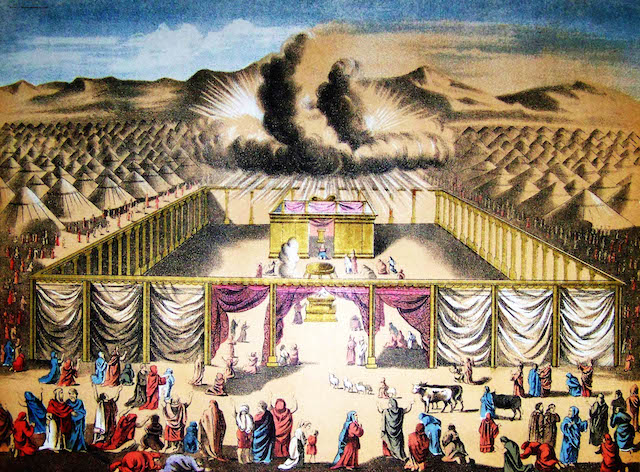Bonjour / Hello [nickname_else_first_name],
Table of contents
1) Perashat Hashavoua - Rabbi Eli Mansour
2) Halakhat Hashavoua (Halakhot related to day to day life) By Hazzan David Azerad - Halachot of Beit Ha Knesset (Eating or drinking)
3) Holy Jokes!
1)PERASHAT HASHAVOUA
This Week's Parasha Insight with Rabbi Eli Mansour
Parashat Terumah- The Torah’s “Footsteps”
The first of the furnishings of the Mishkan discussed in Parashat Teruma was the Aron, the sacred ark, in which the original Torah scroll was stored. G-d commanded that four rings be affixed "Al Arba Pa’amotav" – on the ark’s four "Pa’amot" (25:12), and the poles used to carry the Aron were inserted through these rings along the two sides of the Aron.
Rashi and several other commentators explain the word "Pa’amot" to mean "corners." The Ibn Ezra (Spain, 1089-1167), however, notes that nowhere else in Tanach do we find the word "Pa’amot" used in reference to corners. Instead, this word is used in reference to footsteps, in as the verse in Shir Hashirim (7:2), "Ma Yafu Fe’amayich Ba’ne’alim," which is understood as praising Beneh Yisrael when they journey by foot to Jerusalem for the three Regalim (pilgrimage festivals). And in Tehillim (85:14), G-d is metaphorically described as walking along a road – "Ve’yasem Le’derech Pe’amav." The Ibn Ezra thus concludes that the Aron’s four "Pa’amot" were four "feet" upon which it stood. It would have been disrespectful, the Ibn Ezra writes, for the ark to lie directly on the floor, and so G-d required affixing four feet underneath the Aron on which it rested, and it was on the legs that the rings for the transport poles were attached.
Later Rabbis observed that in the verses cited by the Ibn Ezra, the word "Pa’amot" actually does not mean "feet," but rather "footsteps." Those verses speak not of the feet themselves, but of feet that move and walk. On this basis, some have suggested further insight into the significance of the "feet" underneath the Aron. The Aron, which contained the original Sefer Torah, has "feet" in the sense that it "walks" with Am Yisrael throughout its long, tumultuous history. No matter where we go, and no matter how drastically the world changes, the Torah comes with us. We don’t abandon or revise the Torah, but rather bring its timeless values and principles with us and apply them to the new realities and circumstances that arise.
I have had the privilege to read and study many halachic responsa by the leading Torah sages of the modern era, outstanding figures such as Rav Moshe Feinstein (1895-1986), Rav Eliezer Waldenberg (1915-2006), Hacham Ovadia Yosef (1920-2013), and Rav Shlomo Zalman Auerbach (1910-1995). These scholars addressed all kinds of questions, including issues relevant to modern technology and medicine. In not a single responsa do any of these luminaries write, "The Torah does not have anything to say about this new discovery." In every single essay, they work to determine how the ancient, immutable principles of Halacha apply to the situation presented to them. When we study these Halachic texts, we experience "the Torah’s footsteps," and see how the Torah accompanies us wherever we go, throughout the ages, how the original Torah given to our ancestors at Sinai remains as relevant today as it ever was.
In our personal lives, too, we bring the Torah with us wherever we go. The Torah does not stay behind the curtain in the ark in the synagogue; it accompanies us when we leave the synagogue to return home, go to work, go on vacation, go shopping, or tend to any of our other affairs. The feet underneath the ark teach us that the timeless values and laws of the Torah come with us at all times, and must inform our behavior throughout the day, each and every day of our lives.
2) HALAKHAT HASHAVOUA
Halachot this week are selected and Translated by Hazzan David Azerad
How Should we get our children used to coming to the synagogue?
A person who wants to get his little children used to coming to the synagogue, should do so gradually, initially bringing them to one short prayer ,for example Friday night or Mincha & Seuda Shelisheet .We can try to inform them of the sanctity and dignity of the synagogue as best as they understand it, and that they are coming on the condition that they sit nicely next to us throughout the prayer or as much as possible .We can encourage them by giving a sweet treat like a candy for example for their good behavior and that can strengthen them. Gradually bringing them to sit during a longer Tefila until slowly they get used to it listen to the tunes and like it and hopefully feel the Kedusha of the Beit Hakeneset .Chacham Obadia ZT’l continues in saying that it might not be a Mitzvah all together bringing a child to Beit Hakeneset who might not allow his parents to pray. He suggests that it is preferably better to pray Yachid (alone) at home rather than the children will disturb the parents and congregants ,he encouraged that the best thing to do is to follow his suggestion above –the gradual approach.
Is it permissible to do a Beracha without a kippah?
Maran wrote in the Shulchan Aruch (Siman 2, section 6): "He shall not walk with his head uncovered", therefore, every man who revers G-D, shall cover his head with a Kippah, because of the reverence of the Shechina (G-D) upon him.One who leaves his head uncovered, shows that the yoke of royalty(Hashem) and the Mitzvot is being lifted from him – he feels he no longer has to do them.
When bathing in the sea or in a pool, one does not need to cover his head, and even when he comes out of the water and stays for a while on the beach, he does not have to wear a kippah, as this place is like the bath house, but if he stays for a long time, he should put a kippah on his head.
If one made a Beracha without a kippah for example he will not need to repeat the Beracha.
It is permissible to think or to go over versese or teachings of the Torah without a Kippah, such as while getting a haircut or bathing.
If one is not wearing a Kippah and he hears a Beracha or Kaddish, he should answer "Amen".
Bevirkat Shabbat Shalom Umevorach
David Azerad
3) HOLY JoKeS!!
Selection of funny snippets, loosely related to this weeks parashah or current events, to brighten your day














